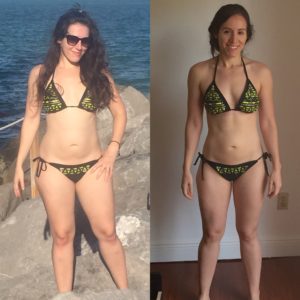My grandfather was an engineer and pilot. A real math guy. As a child, I remember watching him draw charts and fill them with numbers he’d calculated using complex equations. During his funeral service (RIP Grandpoppy), my mother, up at the podium, mentioned how he loved to cipher. I didn’t know what that word meant at that moment, but I continued to listen. She told us how on road trips, much to my grandmother’s chagrin, he would write down the mileage and gallons of gas every time he refilled the tank, continuously calculating how many miles per gallon their station wagon got.
A record screeched in my head. I DO THAT TOO! I thought to myself. It was an odd but comforting revelation that, although neither of us was aware of it, we shared this quirk.
Cipher: to use figures in a mathematical process.
I’ve always been a data collector. As I mentioned, every new tank of gas I calculate how many mpg it got. I use my Fitbit to see how many steps equals a mile (if you’re curious, about 2000.) And when I’m trying to lose weight, tracking my food is just another way to gather information.
To some people, numbers are just numbers. To other people, they carry a much heavier significance.
The ability to remain objective around numbers is one of the top factors in determining whether or not a person should track calories or macros. The same goes for weighing yourself. If you can see the numbers as information and not take them personally or get obsessed, then tracking is essentially harmless.
If you’ve had a history with obsessive or controlling behavior then it might not be right for you. And that’s totally fine. There are other ways to reach your fitness or physique goals.
Personally, tracking food really works for me when I’m trying to lose weight. (And that is pretty much the only time I do it.) While it is a rigorous practice that requires you to be very conscious of what and how much you eat, it just…doesn’t stress me out much these days. It gives me accountability and has been the most effective tool for me to change my body. It’s like figuring out my body’s mpg.
The benefits of traits of tracking your intake are:
- It really puts what you’re eating into perspective
- It teaches you what it looks like to be eating for fat loss, maintenance or weight gain
- It teaches you nutritional info for a variety of foods
- Can be extremely effective for body change if you are compliant
The cons are:
- It’s tedious
- You have to measure/weigh your food
- It can lead to obsessive thoughts and behaviors
- Hard to do when you eat out
Keep in mind that you don’t have to track forever. Even tracking for just a few days or weeks can help you see the big picture.
One of the arguments against tracking is that it doesn’t allow you to be intuitive with the way you eat, but I’d argue that’s more the case with following a meal plan. A meal plan tells you exactly what to eat, which is part of the allure. You don’t have to make any decisions, but you also don’t learn what works for you. I don’t follow meal plans. I basically eat whatever I want and try to fit it in my calories/macros for the day. And so I know what it looks like to eat for fat loss or for maintenance with a variety of different foods because I have tracked.
So who does tracking work for? Given that they don’t engage in obsessive behavior, there are two camps: highly motivated beginners and those who’ve been into fitness for a while and want to level up.
Many beginners find tracking overwhelming, and there’s no need for them to go through that when they’re just starting off. However, for a newb who is up for the challenge, it can be very educational. Someone who has never paid attention to the way they eat before or who knows very little about nutritional data will learn a lot from tracking.
Then there are folks who have been consistently training and practicing healthy eating habits for a while. Maybe their progress has stalled and they want more dramatic results. In that case, more thorough methods may be needed, and tracking can be a tool in helping them reach a specific goal.
With all that said, I would not recommend someone start off tracking in most cases. There are other ways to gain consistency around your eating without counting calories or macros, such as:
- Having protein at every meal
- Eating veggies at every meal
- Drinking enough water
- Incorporating lower-GI carbs
- Start following serving sizes
Take on each action ONE AT A TIME and do not add anything else until you are completely comfortable with the one habit. You may find that just doing this will be enough to see progress. After you’ve become consistent with all of the above, then you may want to take on tracking if you so desire.
I understand the resistance to tracking in the fitness space, however, it doesn’t have to be a negative experience. It is simply a tool. It works for some and not for others. And that’s okay. Ultimately, it’s up to you to decipher what works best for you.



